On Thursday, the Pakistani Senate granted approval for a 120-day extension of the National Accountability (Amendment) Ordinance 2023. The decision was made after Federal Law Minister Ahmed Irfan presented the resolution in the National Assembly. The Senate Chairman presided over a vote on the extension, which was subsequently approved by the majority in the house. The extension is set to take effect from October 31st.
During the debate on the ordinance, Senator Azam Nazeer Tarar, Leader of the House in the Senate, emphasized that the legislative power rests with the parliament to enact laws for the welfare of the public. He underscored that this matter was referred to a committee, and until the committee reports back, the Senate would not grant approval. Thus, any legislation in question would remain in limbo. He also noted that there is no law in the world that can rectify incompetence.
The extension of the National Accountability (Amendment) Ordinance 2023 has stirred discussions on the legality and implications of such an extension under Pakistan’s legal framework. To better understand the situation, it’s essential to delve into the key elements and background of the ordinance.
The National Accountability Bureau (NAB) in Pakistan is an anti-corruption body responsible for investigating and prosecuting cases related to corruption and financial wrongdoing. The NAB plays a crucial role in holding individuals accountable for misuse of public office and public funds. To strengthen its functions and effectiveness, the National Accountability (Amendment) Ordinance 2023 was promulgated earlier.
This ordinance seeks to make several significant changes to the functioning and authority of the NAB. It includes provisions for granting relief to detainees, modifying the process of filing references, and introducing safeguards for businesses and individuals under investigation. Furthermore, the ordinance proposes to strengthen the independence of the chairman and members of the NAB by revising the appointment procedure.
While the intention behind these amendments is to ensure a more balanced and just operation of the NAB, the extension of the ordinance has generated controversy and debate. Critics argue that the extension may infringe upon the principles of justice and accountability. They believe that the extension grants the NAB and the government additional time to operate without comprehensive accountability, leading to concerns about misuse of power.
The legal debate centers around Article 184(3) of the Constitution of Pakistan, which allows the Supreme Court to take suo-motu notice of matters of public importance, particularly those relating to the enforcement of fundamental rights. Critics argue that various suo-motu notices have been issued under this article, and the subsequent decisions, including those related to the Panama Papers case, remain controversial and unresolved.
In response to these concerns, the government has defended the extension of the ordinance, arguing that it aims to bring positive changes in the accountability process. They assert that the amendments seek to strike a balance between the powers of the NAB and the rights of individuals, ensuring due process is followed.
The extension of the ordinance highlights the ongoing struggle to find a harmonious equilibrium between accountability, justice, and the protection of individuals’ rights in Pakistan’s legal and political landscape. The debate is not limited to the legal framework but extends to broader questions about transparency, the rule of law, and the effectiveness of anti-corruption measures in the country.
It is important to note that the extension of the National Accountability (Amendment) Ordinance 2023 is only for a limited period, and its implications and outcomes will be observed closely by stakeholders, legal experts, and civil society in Pakistan. Whether the ordinance succeeds in achieving its intended objectives or leads to further legal and political disputes remains to be seen.



